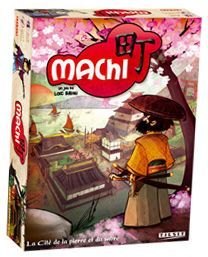Machi (2008) Board Game
Machi is a card game that was first released in 2008 by the publisher Tilsit. It is designed for 3-5 players and has a recommended age of 10 and up. The game has a runtime of about 90 minutes and falls under the category of card games.
Game Components of Machi Koro
How To Setup Machi Koro
Setup involves each player receiving starting establishments and under-construction landmarks, representing the beginning of their corporate city. Each player starts with 3 coins, and the remaining coins are placed in a central area. A display of available buildings is set up, noting that these buildings are limited in number. The game is ready to start once all players have their initial setups and the central coin pool is established.
Gameplay Mechanics and Game Objective
Player Experience
*Machi Koro* offers a light, entertaining experience suitable for both new and experienced players. The game is easy to learn, with straightforward rules and quick gameplay. However, it can be influenced significantly by luck, which may frustrate some players. The game encourages strategic thinking but also involves a fair amount of randomness. The legacy version adds a narrative element and increasing complexity over multiple sessions.
Pros
Cons
Personal Thoughts on Machi Koro
*Machi Koro* is ideal for those who enjoy light, strategic games with an element of luck. It is a great introduction to the world of board games, especially for families or new players. However, hardcore strategy enthusiasts might find it too simplistic. The legacy version adds a compelling narrative and increasing complexity, making it a worthwhile investment for those looking for a game that evolves over multiple sessions. It’s a perfect addition to any game collection, especially for those who value easy-to-learn yet engaging gameplay.
We are supported by our audience. When you purchase through links on our site, we may earn an affiliate commission, at no extra cost for you. Learn more.

